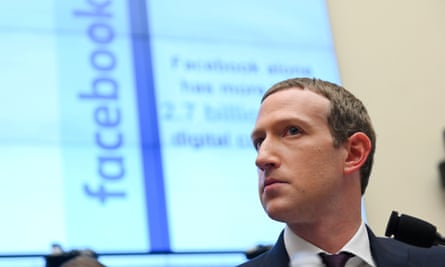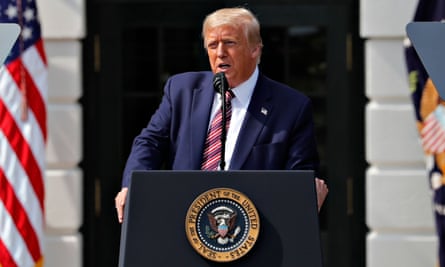
The ex-CIA officer on why she lasted only six months at the tech giant and her fears about its role in the forthcoming US election

Sun 26 Jul 2020 08.00 BST
Yaël Eisenstat was a CIA officer for 13 years and a national security adviser to vice president Joe Biden. Between June and November 2018, she was Facebook’s global head of elections integrity operations, business integrity.
Before you were hired by Facebook to investigate the company’s effect on the electoral process, what was your opinion of it?
Early on, I was a big fan of Facebook. I had lived and worked all over the world, so I used it to stay connected to friends. But, in 2015, I started becoming incredibly concerned that it was becoming a real threat to democracy because of the role it was playing in the breakdown of civil discourse.
So when you were appointed, you were quite excited about the opportunity to effect change?
I was very clear as they interviewed me for the role that what I cared about was Facebook’s effect on our democracy. The fact that they would even hire someone like me for that role made me cautiously optimistic.
But on your second day in the role, your job title was changed – you were effectively demoted?
Correct. Not only was I not empowered to do the job I was hired to do, but I was intentionally sidelined and never able to effect any sort of change or even participate in most of the conversations that were directly tied to the job I was hired to do.
And did that tell you that the company wasn’t serious about addressing the problems it hired you to work on?
Yes. I still turn the question over in my head of why did they hire me to begin with? I do think there are people at Facebook who genuinely want to tackle these challenges, genuinely do not want the platform to be manipulated by bad actors to play elections, but I was hired into the area that actually is the money-making machine, the advertising side of it. So my questions, the things I tried to push, all actually were things that went against their core idea of how it could make money.
After working there for six months what did you conclude?
My first takeaway when leaving was: they are making all sorts of reactive changes around the margins of the issues, [to suggest] that they are taking things seriously – such as building an ad library or verifying that political advertisers who reside in the country in which they advertising – things they should have been doing already. But they were never going to make the fundamental changes that address the key systemic issues that make Facebook ripe for manipulation, viral misinformation and other ways that the platform can be used to affect democracy.

What prevents them from making the necessary changes?
There were three things that guided every major decision, and I recognised them when I was there. One was: whatever we do has to be something that answers the criticism but never opens us up for having to take actual proactive responsibility and threaten in any way our Section 230 immunity. Second, we also need to be very careful not to bite the hand that feeds us – we’re not to anger the powers who are currently in office who could regulate us. And three, every potential solution had to be “scalable”, so we could never address the unique intricacies of any particular country’s elections or political issues.
So is the net result that Mark Zuckerberg has his thumb on the scale for Donald Trump?
I think he has the potential to. I think he’s skating a fine line because he does not want to be accused a second time of helping any particular candidate win the election. When it happened in 2016, I don’t necessarily believe there was a strong intent to get Trump elected. I think it was a series of terrible mistakes because of the business decisions that that company makes, but now I find Mark Zuckerberg’s reaction to different politicians to be very telling. I don’t want to imply that he is purposely trying to get Donald Trump re-elected. But it is in his best interests to have this administration stay in power rather than to have a new administration that will regulate or break up his company. The fact that one individual has the power to tip the scales is a danger.
In a leaked memo, Facebook executive Andrew Bosworth took the line that Trump’s team were better at gaming Facebook than the Democrats, and that’s why they won.
That the Trump campaign absolutely knew how to game the algorithms, how to use the targeting tools to perfection seems pretty clear, but it still begs the question of why do you have algorithms that can be gamed to begin with? Just because one party played with your tools better doesn’t mean that your tools are therefore OK.
What threats does Facebook pose to the process of the 2020 election?
I would put them in two buckets. The first bucket is using the platform to coordinate inauthentic behaviour and manipulating users with disinformation. There was so much focus on how the Russians did that in 2016 but, let’s be real, domestic actors are doing that now. I suspect that there’s a debate internally about this, because it’s politically convenient for Facebook to take down a Russian disinformation network – that is not going to anger anybody in the US – but for them to target a rightwing, domestic disinformation network becomes much more politically tricky because those groups align with the current administration. And that’s what I am concerned they are not doing.
For one example from my time there: there were times where we would get appeals on certain ads, and it would be pretty clear to us that it’s violating our policies, but we would get an answer from our people in Washington that I would call “both sides-ism” – there are bad people on both sides. We would only get that answer when that current piece of content seemed to be coming from the far right. And so I don’t envy Facebook for being in the position where anything they do will anger one party or the other. But, at the end of the day, if you write your policies in a certain way and you enforce them equally – not equally in terms of numbers but in terms of enforcing the policy as it was written – that’s what should matter.

And this is what happened with the recent voter suppression post by Trump that created such an outrage. If you read Facebook’s current civil rights report, they make it very clear that his post about mail-in ballots is not just misleading but actually violated their voter suppression policy, and yet they decided not to enforce that policy against him.
And what’s in bucket two?
Unfortunately, in addition to all of their challenges, we now are going to have an election like no other because of this pandemic. Everybody who follows this knows that there are domestic actors who will absolutely exploit this pandemic to spread intentionally misleading information about our voting process. There are two reasons to do that. One is actual voter suppression, to actually encourage people not to vote; and two is to encourage people to not trust the outcome of the election. Those are two different things and Facebook likes to just focus on the first and say we will take down posts that say things like vote on 4 November instead of 3 November. But what they’re not looking at is the bigger issue of how this has all been set up to intentionally sow distrust in the election process and what’s gonna happen when the president of the United States of America has done everything in his power to tell his base not to trust mail-in ballots.
So, whereas with Covid-19, they claim that they will not allow misinformation about it because they recognise that that would harm the health of society, why would they allow people to post misinformation about mail-in ballots and voting procedures if that’s going to affect the health of our democracy?
Do you think that Facebook’s new oversight board will be any help with this?
Zero. Yes, the oversight board has very impressive people on it. Yes, in theory, it’s an interesting concept.
I have three major issues with it. First of all, it’s another example of Facebook putting responsibility on someone else. The oversight board does not have any authority to actually address any of the policies that Facebook writes and enforces, or the underlying systemic issues that make the platform absolutely rife for disinformation and all sorts of bad behaviour and manipulation.
The second issue is: it’s basically an appeal process for content that was already taken down. The bigger question is the content that remains up. Third, they are not even going to be operational until late fall and, for a company that claims to move fast and break things, that’s absurd.
Geen opmerkingen:
Een reactie posten
Opmerking: Alleen leden van deze blog kunnen een reactie posten.